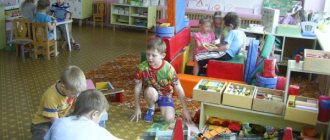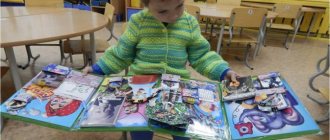Features of organizing the education of preschool children
Definition 1
Education is an organized process of instilling in children generally accepted norms and rules of behavior, transferring the experience accumulated over generations.
When organizing the process of education in a preschool educational institution, educators must first of all remember that each child is a unique individual who needs an individual approach.
It is necessary to raise a child from the first days of his life. According to a number of teachers, good upbringing can ensure a child’s successful entry into society and a productive existence in it. The foundation of education is such personal qualities as kindness, responsiveness, hard work, care, honesty and decency. These are the qualities that need to be nurtured in a child.
Are you an expert in this subject area? We invite you to become the author of the Directory Working Conditions
Note 1
The process of raising preschool children requires that the adults organizing it comply with a number of conditions.
Conditions for organizing effective education of preschool children:
- The use of uniform methods, means and techniques of education in preschool educational institutions and families. The child’s family and the educational institution must work together, “in the same direction.” Therefore, it is very important for the teacher to establish effective interaction with the parents (guardians) of each student.
- Ensuring full interaction between the child and parents. Despite being busy, parents should pay enough attention to their children. This is due to the fact that every child during preschool childhood needs attention from their parents. This could be working together, walking, communicating, etc.
- Their own positive example - adults who are directly involved in the upbringing of preschoolers (parents, educators, teachers), first of all, with their behavior, appearance, demeanor, etc., must set the child the right example of what a well-mannered person looks like. That is, the adults surrounding the child must first of all meet all the requirements themselves.
- An educational environment organized by adults around the child and for him. The environment is created not only within the family, but also in kindergarten, on the playground, etc. A properly organized environment has the necessary educational impact on the child.
- The use of various methods and means of education, their combination, application in accordance with the age and individual needs of the preschooler.
Finished works on a similar topic
Course work Conditions for organizing the training and education of preschoolers 480 ₽ Abstract Conditions for organizing the training and education of preschoolers 280 ₽ Examination Conditions for organizing the training and education of preschoolers 230 ₽
Receive completed work or specialist advice on your educational project Find out the cost
In addition to compliance with the specified conditions for organizing the education of preschool children, it is important to rely on the following principles:
- the principle of active independent activity;
- the principle of continuity of the educational process;
- the principle of continuity between levels of education;
- the principle of integrity of the educational process;
- the principle of psychological comfort;
- the principle of variability in the methods and means of education used;
- principle of creativity.
Note 2
Thus, raising a preschool child requires great efforts from educators and parents in its organization, namely, compliance with certain conditions and reliance on a number of didactic principles.
MAGAZINE Preschooler.RF
MODERN EDUCATIONAL CONDITIONS OF EDUCATION AND DEVELOPMENT IN KINDERGARTEN- E. A. Bazhina, head of MBDOU “Kindergarten No. 172” ,
- E. V. Grokhotova, educational psychologist, MBDOU “Kindergarten No. 172”
(Altai Territory, Barnaul)
The introduction of new state standards for preschool education became the starting point in the issue of revising the established functions of the teacher, who is no longer responsible for the transmission and instillation of knowledge, but for organizing the directed cognitive activity of children, ensuring an intellectual and emotional response.
According to the teachers of our institution, it is not children who should adapt to kindergarten, but a preschool educational institution should strive to create the necessary conditions for each child, taking into account his inclinations and abilities, state of mental and physical health.
In order to implement the Federal State Educational Standard, we strive to create favorable conditions that allow the introduction of modern educational technologies.
A condition for achieving this goal is the use of pedagogical technologies. Pedagogical technology is a set of psychological and pedagogical attitudes that determine a special set and arrangement of forms, methods, methods, teaching techniques, and educational means.
Today, teachers do not have enough knowledge about existing technologies; they also need the ability to apply them in practical activities.
We can highlight the priority pedagogical technologies for our MBDOU, which we use in working with preschool children:
— health-saving pedagogical technologies: technologies for the development of physical qualities, hardening; maintaining and stimulating health (technology of using outdoor and sports games, gymnastics (for the eyes, breathing, etc.), dynamic pauses, relaxation); technologies for using physical education activities, communicative games.
Nowadays, it is very important for us that the methods we use are highly preventive, do not require the use of expensive equipment and materials, fit organically into the daily routine, are not difficult to perform and are based on the main type of activity - games.
-design technology and use of the project method. Our kindergarten teachers actively use project technology in the education and training of preschoolers, and note that this form of work allows them to get to know the students better and penetrate into the child’s inner world. This technology is a unique means of ensuring cooperation, co-creation between children and adults, and a way to implement a person-centered approach to education. The child’s lively, active, interested participation in a particular project is noted, and not a chain of actions as directed by an adult. Working on project activities, we were convinced that the project method is relevant and very effective. It allows preschoolers to experiment, synthesize acquired knowledge, develop creativity and communication skills, create and explore together with their parents, which will allow them to successfully adapt to the school learning situation in the future. The positions of the kindergarten and the family in joint creative activities have become closer, and parents have become active participants in the educational process.
- information and communication technologies. The world in which a modern child develops is fundamentally different from the world in which his parents grew up. This places qualitatively new demands on preschool education as the first link of lifelong education: education using modern information technologies (computer, interactive whiteboard, tablet, etc.). Solving these problems is impossible without updating and revising all areas of the kindergarten’s work in the context of informatization.
-game technology. It is built as a holistic education, covering a certain part of the educational process and united by common content, plot, and character. Learning in the form of a game can and should be interesting, entertaining, but not entertaining. To implement this approach, it is necessary that educational technologies developed for teaching preschoolers contain a clearly defined and step-by-step described system of gaming tasks and various games so that, using this system, the teacher can be confident that as a result he will receive a guaranteed level of learning a child of one or another subject content.
For a teacher who has learned to work at a technological level, the main guideline will always be the cognitive process in its developing state, and the technological approach guarantees the success and effectiveness of students in various types of activities.
And, as Charles Dickens said: “A man cannot truly improve unless he helps others to improve .
Create it yourself. Just as there are no children without imagination, there is no teacher without creative impulses.
"Literature"
- Atemaskina Yu.V., Bogoslovets L.G. Modern pedagogical technologies in preschool educational institutions. St. Petersburg: Detstvo-Press, 2011.
- Salnikova T.P. Pedagogical technologies: Textbook. M.: TC Sfera, 2005.
- Tolstikova O.V., Savelyeva O.V., Ivanova T.V. [and etc. ]. Modern pedagogical technologies for the education of preschool children: method. allowance. Ekaterinburg: IRO, 2013
- Beloshistaya A.V. Game technologies in the education and upbringing of preschool children // Pedagogical technologies. 2010. No. 2. S. - 3-8.
| Next > |
Work according to the Federal State Educational Standard at a preschool educational institution
Natalia Chernysheva
Work according to the Federal State Educational Standard at a preschool educational institution
“What should change in the work of a preschool teacher with the introduction of the federal educational standard?”
Preschool institutions have entered a period of profound qualitative changes.
In other words, a modern preschooler must not only acquire a certain amount of knowledge, but also learn to cooperate, plan his activities, evaluate work , work with different types of information, express himself freely orally and in writing, recognize and understand the differences between people and cultures, understand the value of such a difference and much more.
And he will learn this both in classes and in independent activities.
In recent years, major changes have occurred in the Russian preschool education system, which have increased the requirements for the personal and professional development of teachers. The importance of the initial stage of entry of an inexperienced teacher into the educational environment of a preschool institution has become even more significant.
There is a need for a unified approach to understanding the professional competencies of a preschool teacher, to determining the content, effective methods and forms of organizing training, retraining and advanced training of a teacher, ensuring his readiness to implement PEP in accordance with the Federal State Educational Standard for Education .
The problem of introducing the Federal State Educational Standard cannot be solved without high-quality training of teaching and management personnel.
The main difficulties of teaching staff at the stage of introducing the Federal State Educational Standard for Education :
– simplified understanding of the essence and technology of implementation of the system-active approach;
– a stable methodology for conducting classes that has developed over previous years, the need to abandon methodological developments that have accumulated over many years;
– lack of readiness of educational institutions’ managers and teaching staff to plan and organize the educational process in preschool education in accordance with the requirements of the Federal State Educational Standard ;
– the traditional approach of educational institution leaders to analyzing classes and the desire to adhere to old approaches to assessing the activities of a teacher;
– fundamental novelty of issues of instrumental and methodological support for achieving and assessing planned results (personal, meta-subject and subject-specific)
.
The teacher today should:
– be able and willing to independently acquire the necessary knowledge, skillfully applying it in practice with preschoolers ;
– be able to competently work with information , think critically, process acquired ideas and implement them in your work ;
– be sociable, contactable in various social groups, be able to work together in various areas.
Thus, modern regulatory requirements determined by the preschool education system specify a list of professional competencies that differ in content from the functions performed by the teacher. It will be difficult for a teacher who does not possess certain professional competencies to realize educational goals and carry out his educational activities at a high professional level.
Thus, in our opinion, modern society no longer requires a teacher-performer, but a teacher-researcher, proactive, widely educated, therefore, in their work , preschool teachers should try to present the material creatively, unconventionally, in a new way, organize pedagogical work , and provide preschool children have the opportunity to express themselves as creative individuals
In other words, the teacher’s attitude towards the child as a subject, an individual, a partner with his own opinion must change. Naturally, the age of the children is taken into account.
The main task in the implementation of the right to education for children with disabilities is the creation of conditions for receiving education.
The priority direction of this activity is to identify deficiencies in the development of children and organize corrective work with children who have such disorders. Timely provision of the necessary psychological, medical and pedagogical assistance in preschool age makes it possible to ensure the correction of the main deficiencies in the child’s development by the time the child begins training at the level of primary general education and, thus, prepares him for studying in a general education institution.
As part of this direction, it is necessary to ensure differentiated development, early diagnosis and correction of developmental disorders in children, provision of psychological, pedagogical, social, medical, and legal assistance to families with children with disabilities in physical and (or) mental development, at the place of residence.
The second most important area of activity for realizing the right to education for children with disabilities is the creation of variable conditions for children with various disabilities in physical and (or) mental development to receive education.
Currently in Russia there is a differentiated network of specialized educational institutions directly intended for organizing the education of children with disabilities (hereinafter referred to as correctional educational institutions). It includes, first of all, compensatory preschool educational institutions, special (correctional) educational institutions for students and pupils with disabilities.
In addition, in recent years in Russia the process of integrating children with disabilities into the general educational environment together with their normally developing peers has been developing. Current legislation currently allows for the organization of training and education of children with disabilities in regular preschool educational institutions, general education institutions, institutions of primary vocational education, and other educational institutions that are not correctional (hereinafter referred to as general educational institutions).
Models for integrating inclusive education
There are different integration models. The first, more common in Russia, involves teaching children with disabilities in special (correctional) classes at general educational institutions.
Another option for integrated education is teaching children with disabilities in the same class with children without developmental disabilities. This model of integrated education is being implemented as an experiment in educational institutions of various types in a number of constituent entities of the Russian Federation.
The development of integrated education should be considered as one of the most important and promising areas for improving the education system for children with disabilities.
Organizing the education of children with disabilities in general educational institutions, located, as a rule, at the place of residence of the child and his parents, makes it possible to avoid placing children in a boarding school for a long time, to create conditions for their living and upbringing in a family, to ensure their permanent communication with normally developing children and, thus, contributes to the effective solution of problems of their social adaptation and integration into society.
Special conditions for children with disabilities to receive education
The most general and basic condition for the inclusion of a child with disabilities in the social and – in particular – educational space is the creation of a universal barrier-free environment that allows for the full integration of disabled children into society. At the same time, at the level of the educational institution, this condition is complemented by the task of creating an adaptive educational environment.
We list below the main groups of conditions :
1. Material and technical base, provision with special equipment; possibility of organizing distance learning.
2. Organizational support for the educational process, including the regulatory framework, financial and economic conditions, the creation of an inclusive culture in the organization, interaction with external organizations and parents (it is necessary to develop regulations for interaction with external organizations, local acts of an educational institution implementing inclusive practice) , information and educational support.
3. Organizational and pedagogical support. Implementation of educational programs taking into account the characteristics of the psychophysical development and capabilities of children. Providing the opportunity to master educational programs within the framework of an individual curriculum. Software and methodological support for the educational process. Implementation of variable forms and methods of organizing educational and extracurricular work. Using different types of education. Application of modern educational technologies and psychological and pedagogical support. Adaptation of teaching and educational methods to the special educational needs of students and pupils with disabilities.
4. Comprehensive psychological and pedagogical support, organization of correctional work.
5. Staffing. Special training of teaching staff to work with children with disabilities (children with disabilities), work in conditions of inclusive practice.
A necessary condition for organizing successful education and upbringing of children with disabilities in general educational institutions is the creation of an adaptive environment that allows them to ensure their full integration and personal self-realization in an educational institution.
Material and technical base, provision with special equipment; possibility of organizing distance learning.
In a general educational institution, appropriate material and technical conditions must be created to ensure unimpeded access for children with physical and mental disabilities to the buildings and premises of the educational institution and the organization of their stay and training in this institution (including ramps, special elevators, specially equipped educational places, specialized training, rehabilitation, medical equipment and so on). The creation of such conditions, provided for in Article 15 of the Federal Law “On Social Protection of Disabled Persons in the Russian Federation,” must be ensured without fail, both during the construction of new general educational institutions, and during reconstruction and major repairs of existing educational institutions.
Education and correction of the development of children with disabilities, including those studying in a regular class of a general educational institution, should be carried out according to educational programs developed on the basis of basic general education programs, taking into account the psychophysical characteristics and capabilities of such students.
Issues related to the transfer of children with disabilities to the next grade and leaving them for repeated education must be resolved in the manner established by the Law of the Russian Federation “On Education in the Russian Federation.”
The forms and degree of educational integration of a child with disabilities may vary depending on the severity of the deficiencies in his mental and (or) physical development. For example, children whose level of psychophysical development generally corresponds to the age norm can be trained on an ongoing basis according to a regular educational program in the same class with peers who do not have developmental disabilities, provided that the necessary technical teaching aids are available.
For children whose level of development does not allow them to master educational material in the same conditions as normally developing students, studying in a special (correctional) class at a general educational institution may be more preferable. It is also recommended to ensure the participation of all children with disabilities, regardless of the severity of their developmental disorders, together with normally developing children in educational, cultural, entertainment, sports and other leisure activities.
Particular attention should be paid to the development of the system of education and upbringing of children with complex mental and physical development disorders. This category includes, in particular, children with moderate and severe mental retardation, complex defects (having a combination of two or more deficiencies in physical and (or) mental development), autism, including children in boarding homes of the social protection system. When organizing work in this direction, it is advisable to be guided by methodological recommendations developed at the federal level that take into account the specifics of the educational and rehabilitation process for such children.
Disabled children who, due to health reasons, are temporarily or permanently unable to attend educational institutions, must be provided with the necessary conditions to receive education under a full general education or individual program at home. Establishing the procedure for raising and educating disabled children at home is within the competence of government bodies of the constituent entity of the Russian Federation, which have the right to independently determine the number of teaching hours and cost standards for organizing home-based education for disabled children to the extent that allows for quality education and correction of the child’s deficiencies.
As an effective means of organizing the education of children with disabilities, especially children who have difficulty moving, it is advisable to consider the development of a distance form of their education using modern information and communication technologies.
One of the main components of the socialization of children with disabilities is to ensure their future socially useful employment, which necessitates the need for them to obtain competitive professions. In this regard, significant attention should be paid to creating conditions for children with disabilities to receive primary, secondary and higher vocational education as an important link in the system of their lifelong education, significantly increasing their subsequent employment opportunities.
To assist children with disabilities in realizing their right to receive secondary vocational and higher vocational education, opportunities should be provided for them to take the unified state exam in conditions that correspond to the physical development and health status of this category of graduates.
Psychological, medical and pedagogical support
The leading role in resolving issues of timely identification of children with disabilities, conducting a comprehensive examination of them, preparing recommendations for providing them with psychological, medical and pedagogical assistance and determining the forms of their further education and upbringing is played by psychological, medical and pedagogical commissions.
These issues are also resolved by federal state institutions of medical and social expertise in the process of carrying out, in the established order, activities related to the recognition of minor citizens as disabled children and the development for them of an individual rehabilitation program for a disabled person, containing, among other things, recommendations for organizing their education.
The issue of choosing an educational and rehabilitation route for a child with disabilities, including determining the form and degree of his integration into the educational environment, should be decided based on the needs, developmental characteristics and capabilities of the child, with the direct participation of his parents (legal representatives). A prerequisite for this is the observance of the legally guaranteed rights of parents (legal representatives) of children with disabilities to choose forms of education for children, educational institutions, to protect the legal rights and interests of children, including mandatory agreement with parents (legal representatives) on the issue of referral (transfer) children with disabilities in correctional educational institutions (classes, groups).
Important aspects of activities for the education and socialization of children with disabilities are informing the population about the problems of children in this category, creating a tolerant attitude in society towards children with disabilities in physical and mental development, popularizing the ideas of ensuring equal rights of children with disabilities to receive education, development of integrated education.
The information was prepared by the deputy head of social and psychological support.





